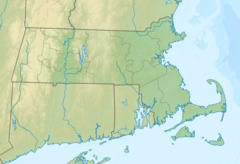Calvin Coolidge Bridge
| Calvin Coolidge Bridge | |
|---|---|
 |
|
| Coordinates | 42°20′11″N 72°37′04″W / 42.33639°N 72.61778°WCoordinates: 42°20′11″N 72°37′04″W / 42.33639°N 72.61778°W |
| Carries |
|
| Crosses | Connecticut River |
| Locale |
Northampton, Massachusetts to Hadley, Massachusetts |
| Maintained by | Massachusetts Highway Department |
| Characteristics | |
| Design | Warren deck truss |
| Total length | 1,440.94 ft (439.2 m) |
| History | |
| Construction begin | 1936 |
| Opened | October 12, 1939 |
| Statistics | |
| Daily traffic | 34,900 |
The Calvin Coolidge Memorial Bridge is a major crossing of the Connecticut River in western Massachusetts, connecting the towns of Northampton and Hadley. The bridge carries Route 9 across the river, where it connects to Interstate 91. The bridge is a major bottleneck in Hampshire County—the only major hospital in the county, Cooley-Dickinson, is located in Northampton on the western side of the bridge. The road approaching the bridge is known as Bridge St. in Northampton (eastbound) and Russell St. in Hadley (westbound).
The Calvin Coolidge Memorial Bridge is a five-span, single intersection Warren deck truss bridge with distinctive design on its granite-faced abutment pylons. Art Deco ornamentation on the pylons includes carved eagles and incised carved lettering. The bridge, a replacement of a previous structure destroyed in the 1936 flood, was funded under the Hayden Cartwright Act, one of the numerous federal aid programs designed to provide construction jobs during the Great Depression. It was designed by W & L Engineering Co. in conjunction with Maurice A. Reidy as consultant and Desmond and Lord as architects. The bridge was built by T. Stuart & Sons.
The bridge was named as a memorial to President Calvin Coolidge (1872–1933), a longtime resident and former mayor of Northampton. Coolidge was elected to the State Senate and the governorship of Massachusetts before being elected President of the United States. A bronze memorial plaque of Calvin Coolidge is mounted on the northeast and southwest pylons.
The bridge features large, distinctive granite-faced pylons in the Art Deco style, measuring 15 by 27 feet at the base. On the northwest and southeast pylons are bronze doors that provide access to a small room reportedly used as posts for air raid wardens during World War II.
...
Wikipedia

